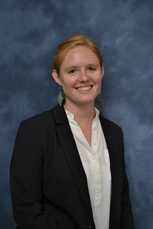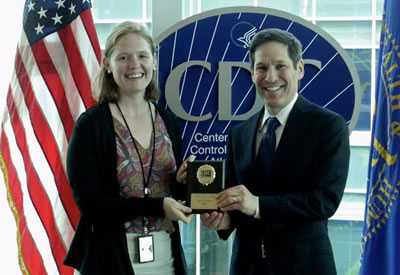PHAP@Work—Emma Prasher

Emma Prasher
PHAP 2013
2015 Salinas Award Winner
Program Areas and Host Sites
Year 1: Global Migration and Quarantine, Philadelphia Quarantine Station
Year 2: Acute Communicable Disease, Philadelphia Department of Public Health
How Emma helped extend Philadelphia and Guinea’s infectious disease surveillance programs
Emma Prasher arrived in Philadelphia in summer of 2013 to work at the quarantine station,
conducting a variety of infectious disease surveillance activities, and she soon became an exemplary PHAP associate.
Philadelphia Quarantine Station, Year 1
In her first-year assignment at the CDC Philadelphia Quarantine Station at the Philadelphia International Airport, Emma participated in all station duties, which consisted of illness responses, training port partners, reviewing and clearing CDC-regulated items, and reviewing medical records of newly arriving immigrants, refugees, and asylees.
In addition to her station duties, Emma—
- Screened incoming air travelers to ensure they weren’t entering the United States with an infectious disease
- Coordinated with airlines and state and local health departments to initiate contact investigations on transportation for patients who had traveled in Europe and Africa and been diagnosed with an infectious disease
- Worked with state and local health departments and federal agencies to develop an emergency mass medication dispensing plan for the airport’s 20,000 employees
Philadelphia Department of Public Health, Year 2
In her second-year assignment, Emma worked within the Acute Communicable Disease (ACD) program at the Philadelphia Department of Public Health (PDPH). There, she managed the case-based influenza (flu) surveillance program, supported PDPH’s Ebola response efforts, and coordinated outreach activities to inform the public about infectious disease preventive measures.
As the project lead for PDPH’s case-based surveillance for hospitalized and fatal cases of flu, Emma refined the system to ensure timely reporting. She identified 15 previously unreported flu outbreaks in long-term care facilities. By identifying these outbreaks, PDPH was then able to confirm the facilities followed appropriate prevention and control recommendations to limit further spread.
“Throughout the 2014–2015 flu season, Emma investigated more than 900 cases and managed these data with impeccable quality—something we couldn’t have done with her, due to staffing limitations,” says her second-year host site supervisor, Dr. Ami Patel, PhD, MPH, Career Epidemiology Field Officer. “Emma worked with hospitals and laboratories to investigate hospitalized influenza-associated cases and created weekly surveillance reports.
She learned SAS® (health analytic software) very quickly, which was commendable given how complicated the software can be for new users.” Emma then updated protocols and points of contacts related to case investigation and helped correct inaccurate data records.
Emma also was a critical member of PDPH’s Ebola response team. With her French-language skills and African cultural awareness, she was instrumental in Ebola monitoring with newly arrived French-speaking passengers from Guinea, Liberia, Sierra Leone, and Mali, including 42 passengers who needed additional active monitoring. Finally, Emma organized bimonthly grand rounds on Ebola and produced quarterly Ebola-focused newsletters distributed to hundreds of Philadelphia health professionals.
PHAP in the Field: Emma Prasher

Emma Prasher receives the 2015 Louis Salinas Award from Dr. Frieden.
Emma’s hard work resulted in her receiving the 2015 Louis Salinas Award. This top honor is given to one PHAP associate each year in memory of CDC’s Mr. Louis Salinas, a CDC public health advisor known for his exemplary commitment to public health. Emma received the award from Dr. Frieden at the PHAP spring training at CDC headquarters (pictured right).
On Emma’s nomination form, Dr. Patel wrote: “With her personal demeanor, skill set, and willingness to take on a variety of duties and responsibilities, Emma is an exceptional public health professional. She creates her own path and is not afraid to speak up. Her questions and input are of value and are almost always used to improve program performance.”
“I was so honored to win the award,” says Emma. “It was quite unexpected—so much so that I missed the presentation ceremony because I was at the CDC clinic getting vaccinations in preparation for my Ebola-response assignment in Guinea. I would have much rather been receiving an award than those shots,” she jokes.
Shortly after receiving her honor, Emma began her international assignment. As part of the Infection Prevention and Control team in Conakry, Guinea, Emma helped set up triage systems at healthcare facilities. “I enjoyed practicing on-the-ground public health and working with an energetic team of international public health partners.Being in Guinea was an eye-opening experience that solidified my desire to focus on global health in the future.”
“Emma is a model public health professional,” says Dr. Patel. “She is hard working, takes initiative, works well with others, is organized and efficient, and demonstrates commitment to the field. This was particularly evident in her general infectious disease surveillance activities, daily communication with travelers from Ebola-affected countries, and willingness to identify community partners to support program activities and provide training.”
What Next for Emma?
“PHAP has been a great learning experience,” says Emma. “I’ve learned the importance of relationship building—whether with colleagues, patients, or partner organizations. PHAP also allowed me to build on my cultural awareness, showing me that cultural sensitivity is important both in the US and abroad.”
Up next for Emma is working in CDC’s Division of Global Migration and Quarantine in Atlanta, and then she’ll start an accelerated graduate nursing program at Emory University in 2016.
- Page last reviewed: October 5, 2015
- Page last updated: October 5, 2015
- Content source:



 ShareCompartir
ShareCompartir



